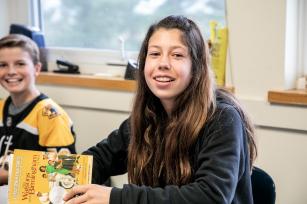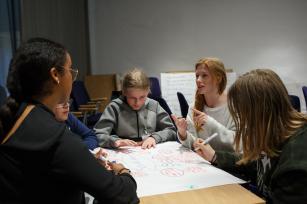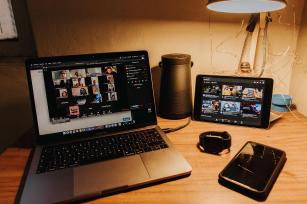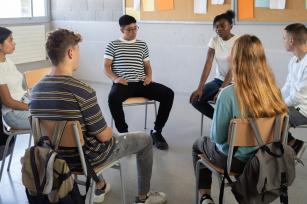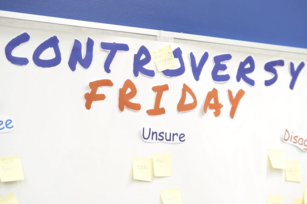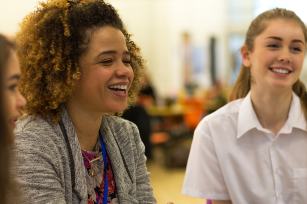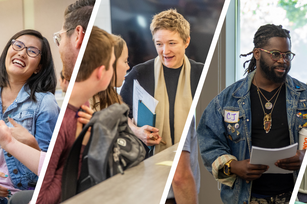
Breadcrumb
- Essential Partners
- Our Impact
- Impact Stories
- Creating Strong, Open, Inclusive School Cultures with Dialogue
Creating Strong, Open, Inclusive School Cultures with Dialogue
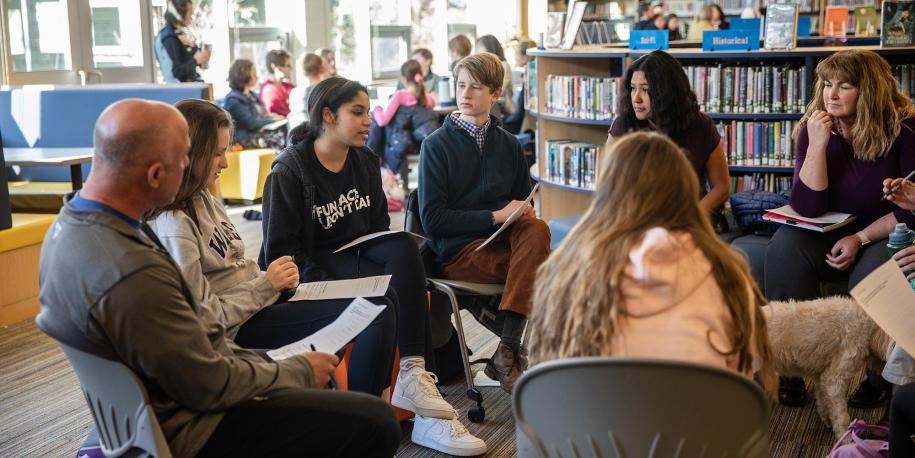
“Essential Partners's dialogue initiative is, literally, the best forum I have attended during my time at this school. The openness and sharing in our group led to genuine connections. I’m not sure words can express how meaningful this event was to me. Truly priceless.”
High School Parent
Cary, North Carolina
To inspire a generation of bridge-builders and peace-makers, Essential Partners is equipping secondary and middle school students to have essential conversations in their schools and communities.
In 2018, Essential Partners received a generous grant to consolidate and build on years of work in higher education, adapting those tools for the nation’s secondary and middle schools. Piloted with a cohort of public and private schools in Massachusetts, North Carolina, and Wyoming as well as networks of schools in Boston and New York, the Dialogic Classroom model has been adapted to meet the needs of a new context.
“Schools today face unique challenges like no other time in history,” said Allyson Bachta, a longtime K-12 public school educator who also serves as a project advisor for Essential Partners. “EP's approach is flexible enough to support educators working across diverse contexts and parallels work that they are already doing to support students' social-emotional development, create trauma-sensitive classrooms and schools, and differentiate learning experiences to meet the needs of all learners.”
In addition to meeting educational goals, EP’s expanded Dialogic Classroom model encourages inquiry, reflection, and civil discourse—all virtues that make a free society possible. Hundreds of teachers, administrators, students, and parents have participated in Reflective Structured Dialogues as well as Dialogic Classroom training.
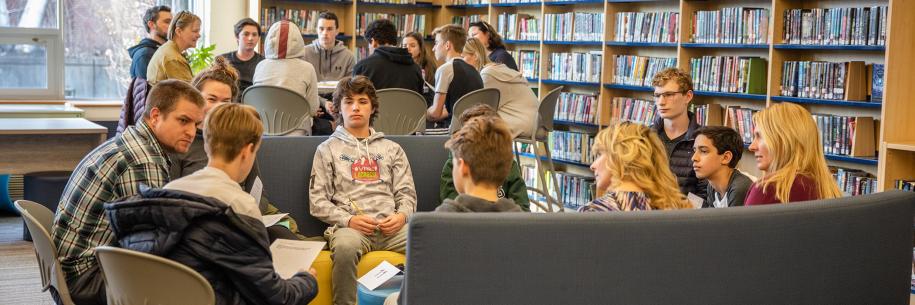
Curiosity, Diversity, Inclusion, Dignity
EP’s engagement with these early pilot schools has been transformative, underscoring the value of conversations across differences and respectful engagement around differing viewpoints. Students and teachers alike have noticed the shift.
“I learned that through productive dialogue, you can make relationships and friendships with people through talking about your differences and similarities,” said one Newburyport High School student. Another student reflected that they understand more about the students around them and feel less alone now because of dialogues held at their high school.
By training a broad base of stakeholders—students, teachers, administrators, and parents— entire school cultures have changed. People report healthier conversations, more curiosity, an openness to new ideas, and a willingness to learn from others.
"EP's approach allows all the students in the room to speak and be heard,” said one teacher, “to think about different perspectives on the issue without getting into arguments or fights.”
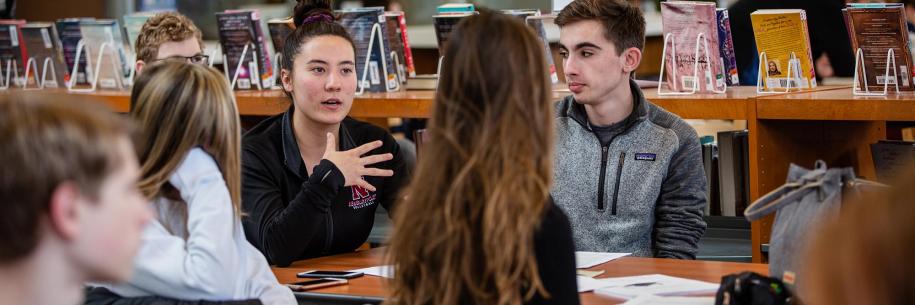
"EP's approach allows all the students in the room to speak and be heard, to think about different perspectives on the issue without getting into arguments or fights.”
Educator
Newburyport High School
The Dialogic Classroom empowers educators to lead essential classroom conversations. "EP's approach has given me tools to deal with what comes up in my classroom,” said another teacher. “I teach classes about charged topics. As I’m thinking about and exploring ways to broach these conversations with students, I use EP’s approach.”
An educator from Cody, Wyoming, remarked that she noticed more analytical thinking from students in dialogue than in either essays or Socratic discussions.
Students are also empowered to lead their own dialogue initiatives. Following school closures in response to the COVID-19 pandemic, a student in Cody designed, organized, and facilitated a series of dialogues among students and teachers about the loss of their social networks and enrichment activities.
“I can't even begin to explain the gratitude and fulfillment I felt from participating in this Essential Partners COVID-19 dialogue,” said one student. “It helped me better understand myself and what I hope to accomplish throughout this period of uncertainty.”
More recently, Black educators from several independent schools in North Carolina used EP’s approach to talk about the stress of managing both the pandemic and the George Floyd protests. Likewise, Cary Academy coordinated a series of dialogues with the parents of students of color, giving them the chance to build community and find mutual support.
“Essential Partners's dialogue initiative is, literally, the best forum I have attended during my time at Cary Academy,” said one parent. “The openness and sharing in our group led to genuine connections. I’m not sure words can express how meaningful this event was to me. Truly priceless.”
Changing the Educational Paradigm
The success of EP’s innovations for middle and high school contexts has led to a surge of interest from schools across the United States. In communities large and small, educators want to encourage open, inclusive, civil discourse about tough topics alongside self-reflection and self-exploration.
Peer dialogues about race and racism are currently being planned by EP-trained students in North Carolina. Ravenscroft School, also in North Carolina, hopes to collaborate with EP to bolster their anti-racism curriculum, in coordination with the Anti-Defamation League.
Co-Executive Director John Sarrouf has been collaborating with the Edward M. Kennedy Institute for the U.S. Senate to train Massachusetts civics teachers in the dialogic classroom approach. The Commonwealth’s students will learn the mechanics of American democracy while practicing the habits of mind that make democracy possible.
“The Dialogic Classroom isn’t just another classroom management system,” said Sarrouf. “It’s a container for conversations about deeply-held beliefs and formative experiences. The Dialogic Classroom is a new educational paradigm that empowers students to explore different values, perspectives, and identities.”
Related Impact Stories
Testimonials

Program ParticipantI did not anticipate having as many concrete takeaways as I do. I feel there is an immense practical application.

Teresa Grettano, Associate Professor and Director of the First-Year Writing programFacilitated dialogue creates a classroom atmosphere in which exploring uncomfortable issues and asking difficult questions is an expected part of the process, and it allows students space to engage each other without fear of the vitriol common in our public discourse.
University of Scranton (PA)

10th Grade StudentEP's questions of understanding exercise felt like the debate that we wish the presidential candidates would have—instead of having to listen to two old guys yelling over each other.
Ravenscroft School, NC

Secondary School TeacherEP's approach allows all the students in the room to speak and be heard, to think about different perspectives on the issue without getting into arguments or fights.
San Diego, CA

Kimberly Shaw, EducatorStudent facilitators flip the script. When students lead, you can see a change occur, a shift as they understand the difference between being a participant and being a facilitator, as they work to hear and address the needs of their classmates and community.
North Carolina

High School StudentI learned that through productive dialogue, you can make relationships and friendships with people through talking about your differences and similarities.
Newburyport, MA

Nicki Glasser, Policy CoordinatorWhat surprised me was how much you could transform a relationship during a three-hour conversation.
Transformation Center, Massachusetts

Sophia Hopper ’24Dialogue changed how I think about the way my school runs.… now I know the people running this institution. I know their values. I know their story. There's a whole new level of trust in the institution itself.
Ravenscroft School, North Carolina

Cat Anderson, EducatorIt's incredible to really see the evolution and the change of these students, once they're given the tools—and Essential Partners has really helped me do that.
Boulevard Academy, Oklahoma

Linda Gryczan, MediatorInstead of demonizing and dehumanizing the other, we built a deeper connection. The fact that we disagree matters much less. It matters much more that we are neighbors in this community.
Montana Mediation Association

Cricket Fuller, The Christian Science MonitorThis wasn’t a policy debate [about guns]. Instead, two people whose backgrounds and views diverged in almost every way possible shared a moment of honesty that struck at the heart of the matter.
Boston, Massachusetts

Allyson Bachta, K-12 Educator and AdministratorEP's approach is flexible enough to support educators working across diverse contexts and parallels work that they are already doing to support students' social-emotional development, create trauma-sensitive classrooms and schools, and differentiate learning experiences to meet the needs of all learners.
Massachusetts

High School StudentThe thing that surprised me, was the amount of respect given to each person while speaking in the meeting. I thought that discussing politics would eventually cause problems, but it did not.
Raleigh, NC

Vibhav Nandagiri ’21When a debate occurs, you never feel like you get to hear a person’s full point of view. But, through dialogue, you get to learn someone else’s perspective without any competitive need to win an argument. It leads to mutual understanding; listening to each other helps us chip away at our differences.
Cary Academy, NC

Meirav Solomon ’21Vulnerability is the key. A lot of perspective-taking is based in vulnerability. It’s the key ingredient in a good structured dialogue. It’s crucial to the ‘meet me in the middle’ experience that dialogue is all about.
Cary Academy, NC

Lucinda Garcia, Researcher, Educator & AdvocateThe Dialogic Pedagogy Fellowship at Tufts University, in collaboration with Essential Partners, gave me transformative social-emotional learning and facilitation skills to support meaningful dialogue in the classroom. I’m excited to apply what I’ve learned to design questions that invite personal narratives, value-based discussion, and comfort with complexity—all in service of building a classroom climate where productive dialogue and engaged learning can flourish.

Megan DeFranzaHere safe space was created for pastors and church leaders to wrestle with topics like evolution which are all too often “off limits” or believed to be antagonistic to the faith.
Gordon College, Massachusetts

Meirav Solomon ’20Dialogue not only teaches you how to interact and understand more deeply those around you, it also teaches you more about the world around you and yourself. I think dialogue is super important to my growth as a student, a global citizen and a human being. I have learned to listen, I have learned to speak out, I have learned how to access my stretch zone (where I feel uncomfortable speaking but not turned off) and I have learned where my limits are.
Cary Academy, NC

Clay Thornton ’21Having an environment that gives you that space to listen to others talk about their experiences and understand how those experiences have led them to the opinions that they have—it is truly eye-opening.
Cary Academy, NC

Andrew Wulf, PrincipalThe community dialogue was instrumental in helping us create a new policy around class rank. Though a controversial topic in the community, the dialogue EP helped us run ensured all voices were heard and valued. Regardless of how people felt with the final result, one parent summed it up best for us, ‘sometimes the process is more important than the outcome’.
Newburyport High School

Secondary School TeacherI’m a world history teacher… now I feel I’m more empowered about how to make connections across differences. I have a better skill set to facilitate connections.
New York City

Becca Humphries ’21The dialogue setting created an environment where people weren’t afraid to open up and share those things that they might not always share out loud. It made us feel closer and provided a stronger sense of trust. It allowed me to be vulnerable to people outside of my community and to be open to sharing.
Cary Academy, NC

High School StudentIt honestly surprised me that we were doing [dialogues about the 2020 election] in the first place. I have gone to this school since Kindergarten, and I have seen the recurring pattern of the faculty and staff looking to keep politics out of school discussion, which is completely understandable. Growing up this way has built a sort of stigma around politics that I feel like affected my experience in these activities. This also prompted me to learn more about how I feel about these topics.
North Carolina

Becca Humphries ’21The dialogue setting created an environment where people weren’t afraid to open up and share those things that they might not always share out loud. It made us feel closer and provided a stronger sense of trust. It allowed me to be vulnerable to people outside of my community and to be open to sharing.
Cary Academy, NC

Parent, Cary AcademyEssential Partners's dialogue initiative is, literally, the best forum I have attended during my time at Cary Academy. The openness and sharing in our group led to genuine connections. I’m not sure words can express how meaningful this event was to me. Truly priceless.
Cary, North Carolina

Misty Stoll, School Board TrusteeI ran for my local school board in 2018 and was elected. I use the skills in our meetings, whether I’m chairing the meeting or not. This makes the meetings much more productive. We don’t go over the same topics over and over again.
Wyoming

High School StudentThe most significant thing I've learned in this program is that having an open mindset when listening to others' opinions different from yours to understand their perspective instead of finding the flaws to oppose their opinion to try and change their mind.
Raleigh, NC

High School StudentSimply changing the wording of a question can invite a completely different personality and emotion around a question. You can learn so much more and have a better understanding of someone's perspective by changing your question.
Raleigh, NC

Bob Bordone, Expert and AuthorEssential Partners does the best work in the field of dialogue and communication.
Harvard Negotiation & Mediation Clinical Program, Co-Founder

High School StudentI can't even begin to explain the gratitude and fulfillment I felt from participating in this Essential Partners COVID-19 dialogue. It helped me better understand myself and what I hope to accomplish throughout this period of uncertainty.

Program ParticipantThis is the best adult learning experience I have had in the past five years. I wanted to learn new skills—I did!

Secondary School TeacherEP's approach has given me some tools to deal with what comes up in my classroom. I teach classes about charged topics. As I’m thinking about and exploring ways to broach these conversations with students, I use this.
New Jersey

Jordan Cuffee ’21The dialogue training allowed me to push myself to speak up first. In an informal conversation, I’m not usually the first person to voice my opinion; I usually end up listening, rather than taking a stance on sharing my opinion. But the dialogue training empowered us to decide if we want to say something now or listen. It really made me feel part of the conversation, rather than being on the outside, observing.
Cary Academy, NC

Kim Davidson, OmbudsI’ve gained not only confidence but tools. The Essential Partners training was worth every penny.
Oberlin College, Ohio

Program ParticipantI felt an amazing sense of accomplishment when the Essential Partners training ended; that I'd done something important for my community and something important for me.
Massachusetts

Belle AbayaTogether, we married our ideas to create a dialogue model that took into consideration our young people’s particular needs, and our culture.
The Conflict Resolution Group Foundation, Philippines
